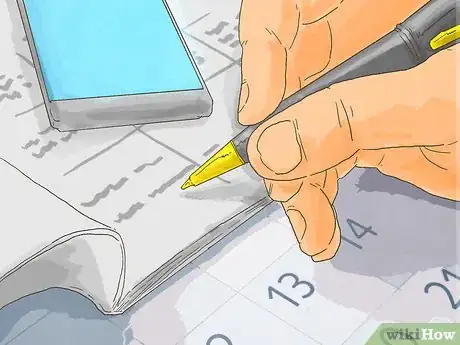This article was co-authored by Emily Listmann, MA. Emily Listmann is a private tutor in San Carlos, California. She has worked as a Social Studies Teacher, Curriculum Coordinator, and an SAT Prep Teacher. She received her MA in Education from the Stanford Graduate School of Education in 2014.
There are 14 references cited in this article, which can be found at the bottom of the page.
wikiHow marks an article as reader-approved once it receives enough positive feedback. In this case, 87% of readers who voted found the article helpful, earning it our reader-approved status.
This article has been viewed 110,036 times.
As you move into your final year of middle school and prepare to head to high school, this is an excellent time to get your grades on track. If you want to earn straight A’s throughout your 8th-grade year, you will need to understand what is expected of you, stay organized, and put in some hard work. If you stay dedicated and keep your eye on the prize, getting straight A’s can happen for you.
Steps
Embracing New Challenges
-
1Get ready for high school. In 8th grade, the focus will be on preparing you for high school. The exams will probably be harder, you'll probably spend some time with a guidance counselor, and your teachers will expect more from you. Meet these challenges head on! Begin studying for tests far in advance.[1]
- Brainstorm ideas about what you'd like to do with your life, so that your guidance counselor meetings are productive.
- Take responsibility for your organization and your grades by working hard without being told to. Taking an active approach to these challenges will best prepare you for the transition to a new school.[2]
-
2Strengthen your skills. Although curricula will vary, you can expect certain similarities across 8th grade. Basically, in every subject you’ll be asked to look at things in greater detail, use more critical thinking skills, and make deeper connections.[3]
- In English or language arts classes, you can expect an emphasis on persuasive and expository writing (writing that offers an explanation). Begin keeping a journal or diary to strengthen your expository writing skills.
- In history or social studies, you will be asked to relate the past to the present in greater detail. You can practice this skill whenever you watch a movie. Ask yourself: Which elements of this movie relate to older movies you have seen? Which elements relate to things from your real life?
- Across all of your classes, there will be a greater emphasis on class discussion. Write down questions or comments you have while you are at home doing homework, so that you always have something to contribute.
Advertisement -
3Embrace reading. In 8th grade (and into high school and college), you are going to be expected to do more reading. You will be asked to read longer novels in your English classes, and you will need to read and understand challenging math, science, and history textbooks. If you struggle with reading, now is the time to seek some help. If you hate to read, now might be a good time to let that go. Start reading a little bit each night to strengthen your skills.[4]
- Try reading the conclusion first. If you know the main idea before you begin, you may have an easier time understanding what you are reading.
- Look up words you don't know. Taking the time to look up words will enable you to understand the reading, while building your vocabulary and making you a better reader over time.
- Read at the right time. Some people will have a better time reading in the morning, and others at night. Others will read best right after lunch. Find your ideal reading time, and try to get your reading done when it is optimal for you.
Staying Organized
-
1Make sure you have the right school supplies. Before school starts for the year, your teacher should give you a list of anything you’ll need to buy. Make sure that you get everything on this list, and keep all of the necessary supplies with you at school. This can include things like:[5]
- Notebooks
- Binders
- Pens
- Pencils
- Colored pencils
-
2Find your organizational method. As mentioned above, 8th grade is geared toward preparing you for high school, and learning strong organization skills is a big part of that. Different people have different organizational methods that work for them, so you will need to try different things that work for you. Additionally, make sure you clean out your school desk, home desk, locker, and backpack once a week to keep things tidy and organized.[6]
- For example, you may want to have one folder and one notebook dedicated to each class.
- You may want to create folders on your computer at home where you can save schoolwork.
- You may want to use a color system. If you use a blue folder and notebook for math, you can also use blue post-its for math reminders, and highlight math assignments in your planner with a blue highlighter.
-
3Use a planner. In 8th grade, teachers will expect more from you. You will be expected to remember what readings or assignments are due without your teacher reminding you. You will need to anticipate big assignments or tests and start working on them a while before they’re due. In order to do this, you are going to need a good daily planner. Write everything down in this planner as soon as you can, and check in with your planner every single day.[7]
- Write down the dates of exams, quizzes, and tests.
- Write down major assignments.
- Write down daily homework assignments and/or reading.
-
4Keep track of your grades. In order to earn an A in each class, you will need to earn 90% or more of the points (on a typical grade-scale). Your teachers can give you a breakdown of how these points are distributed between classwork, homework, tests, and other categories (like participation). Begin a chart (or spreadsheet) for each class. Each time you get an assignment back, mark the points on your sheet. This will allow you to know what marks you need on further assignments to stay at the “A” level.
- Check rubric requirements for each assignment that you are given. Make sure you meet the necessary standards to get full points.
- Follow instructions intently and ask for clarification if you are confused about any grading choices.
Working Hard
-
1Aim for perfect attendance. If you want to earn straight A’s, you need to be present in class to learn. Every time you skip class, you risk missing an essential lesson, learning the answer to a test question, or getting the explanation for a big assignment. Furthermore, in some classes you may lose points for absences. The first step in earning straight A’s in 8th grade is to be present for class every day.[8]
- If you must miss class, be sure to make up what you missed.
- Ask a friend to take notes for you, and speak to your teacher to ensure that they got all the proper information.
-
2Take good notes. In 8th grade, you are going to be expected to take notes. But taking good notes does not mean furiously writing down everything your teacher says. Instead, you can follow a few strategies for taking good notes:[9] [10]
- Start a new sheet of paper every day. Write the date at the top of the sheet, as well as a heading that states the subject of the class.
- Write down key facts. Listen up for important facts, dates, or examples and write these down. If you recognize something your teacher is saying from the reading, this is likely something important.
- Don’t worry about using complete sentences. Develop your own shorthand, abbreviations, and shortcuts.
- Ask your teacher to repeat something you missed.
- Review your notes after school each day. You may even want to rewrite your notes for more clarity.
- Consider comparing notes with a trusted classmate. You each may have emphasized different things and could benefit from sharing.
-
3Create a study routine. If you want to excel in 8th grade, you are going to need to create a study routine (and stick to it). Set aside time each night to study and to complete any upcoming assignments. Do this each day even if you do not have anything due.[11]
- Spend 10-15 minutes reviewing material that you learned that day.
- Spend 30-40 minutes completing the most urgent assignments.
- Spend 10-15 minutes beginning work on other assignments, or studying for tests, that will not be due for a little while.
-
4Create a “homework space” at home. Choose a place for you to do your homework at home. Ideally, you will have a desk with a chair and a computer. Keep any important materials here, and be sure to keep this place tidy. Having a dedicated homework space helps solidify your homework routine, and get you in the right mindset to work.[12]
- You may have an office in your home that you can claim for an hour or two each day.
- You may be able to set up a section of your bedroom for this purpose.
- If all else fails, you can probably set up shop at your kitchen or dining room table.
- All that matters is that you are comfortable, you won't be distracted, and that you have access to all the materials you need.
-
5Prepare for school physically. If you want to do well in 8th grade, you need to come to school ready and able to concentrate. This means two things: getting a good night’s sleep and eating a healthy breakfast. If you do these two things, you will be able to pay attention during class, learn the material, and excel in 8th grade.[13]
- Try to get 8 hours of sleep per night and keep a regular bedtime.[14]
- Studies have shown that adolescents who eat whole grains with milk had better academic performance than both those who had no breakfast and those who had sugary cereals.[15]
- It is also helpful to eat healthy snacks throughout the day. Things like "ants on a log" (celery with peanut butter and raisins), hummus and veggies, and all-natural fruit leathers are great options.[16]
Expert Q&A
Did you know you can get expert answers for this article?
Unlock expert answers by supporting wikiHow
-
QuestionHow do I concentrate when I am too addicted to television?
 Emily Listmann, MAEmily Listmann is a private tutor in San Carlos, California. She has worked as a Social Studies Teacher, Curriculum Coordinator, and an SAT Prep Teacher. She received her MA in Education from the Stanford Graduate School of Education in 2014.
Emily Listmann, MAEmily Listmann is a private tutor in San Carlos, California. She has worked as a Social Studies Teacher, Curriculum Coordinator, and an SAT Prep Teacher. She received her MA in Education from the Stanford Graduate School of Education in 2014.
Test Prep Tutor
-
QuestionWhat is the best way for me to learn a lot of material?
 Community AnswerIf you are trying to learn lists, try learning them 5 items at a time. For example, if you want to memorize the Greek alphabet, start with Alpha, Beta, Gamma, Delta, Epsilon. Repeat it until you remember it well. Next, study the next five letters until you remember them too, and so on.
Community AnswerIf you are trying to learn lists, try learning them 5 items at a time. For example, if you want to memorize the Greek alphabet, start with Alpha, Beta, Gamma, Delta, Epsilon. Repeat it until you remember it well. Next, study the next five letters until you remember them too, and so on. -
QuestionHow do I concentrate on my teacher when others are distracting me?
 Community AnswerIf classmates are distracting you by talking to you directly, try sitting in the back of the class. They will be less likely to talk to you then, because they'd have to turn around to do so, which can get them into trouble. If a particular classmate is distracting, then you can ask the teacher if he or she could move you to a different seat. Explain that the student is preventing you from focusing and learning.
Community AnswerIf classmates are distracting you by talking to you directly, try sitting in the back of the class. They will be less likely to talk to you then, because they'd have to turn around to do so, which can get them into trouble. If a particular classmate is distracting, then you can ask the teacher if he or she could move you to a different seat. Explain that the student is preventing you from focusing and learning.
References
- ↑ https://kidshelpphone.ca/get-info/high-school-101-how-prep-big-changes/
- ↑ http://www.schoolfamily.com/school-family-articles/article/10665-eighth-grade-academics-what-to-expect
- ↑ http://www.schoolfamily.com/school-family-articles/article/10665-eighth-grade-academics-what-to-expect
- ↑ http://www.schoolfamily.com/school-family-articles/article/10665-eighth-grade-academics-what-to-expect
- ↑ https://www.understood.org/en/articles/tools-and-tips-to-help-your-teen-get-organized
- ↑ https://kidshealth.org/en/teens/focused.html
- ↑ https://cmms.palmbeachschools.org/students___parents/tips_for_using_a_planner
- ↑ http://blogs.edweek.org/edweek/rulesforengagement/2014/09/attendance_affects_achievement_study_provides_state-by-state_look.html
- ↑ http://www.greatschools.org/students/academic-skills/661-succeeding-in-middle-school.gs?page=all
- ↑ http://kidshealth.org/en/teens/take-notes.html
- ↑ https://www.thechildrenscenter.com/2020/03/30/daily-schedule-ages-13-18/
- ↑ https://kidshealth.org/en/teens/homework.html
- ↑ http://kidshealth.org/en/teens/how-much-sleep.html
- ↑ https://www.cdc.gov/healthyschools/features/students-sleep.htm
- ↑ https://www.cdc.gov/healthyschools/nutrition/facts.htm
- ↑ https://kidshealth.org/en/teens/healthy-snacks.html










































































